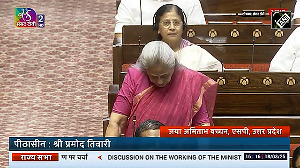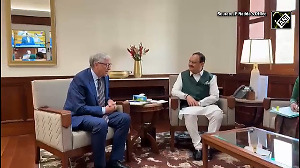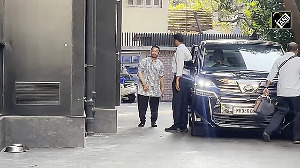As New Year revellers count down to the last second of 2005 this December 31, time will, literally, stand still for a moment. But only for a second, as standard clocks around the world will add an extra second to the year, to make up the difference between solar time and "real" or "absolute" time.
For the first time in seven years, that is, since 1998, a "leap second" will be added to time standards, on instructions from the International Earth Rotation and Reference Systems Service located in the United States.
Indian Standard Time will also add this time difference. IST is monitored and controlled by the National Physical Laboratory in Delhi, which maintains SI units in India and also calibrates the national standards of weights and measures.
"Through an act of Parliament, we have been designated the official timekeepers of India. And it is our responsibility to see that we keep time properly," says Dr P Banerjee, head of the Time and Frequency Division at NPL.
This time-addition, however, takes place even as scientists, astronomers and technologists debate on the need for "leap seconds" at all. The International Telecommunications Union at Geneva recently postponed its decision on a proposal to ban leap seconds from December 2007, in view of continuing discussions on the subject.
"The debate was postponed because people are confused," says Dr Banerjee. There are two time systems, which are accepted worldwide: International Atomic Time, based on relatively stable, invariant atomic clocks, and Universal Time, derived from the rotation of the earth.
The difference between the two systems should not exceed 0.9 seconds. If so, it is decided to give a jump in the opposite direction, and this jump is colloquially termed "leap second".
"The decision to introduce positive or negative leap seconds was made in 1971, and the first was added the following year. Since then, we have added 22 such seconds to our clocks. And this will be the 23rd time in the history of time," he said.
"NPL has been following the system for years. If the ITU chooses to continue with it, it is fine. If it chooses to ban it, there is still no problem," he added.
One faction in the debate suggests that this time differential need not be maintained at all. "One can perhaps consider it when the difference reaches that of one hour, which means 3,600 seconds. And taking an average addition of +/-1 second per year, it means approximately 3,600 years, which is equivalent to several human lifetimes," the scientist said.
Astronomers and navigators who want their clocks to match the natural day-night rhythm of Earth's rotation tend to prefer the leap second because it helps them keep track of where astronomical objects are in the sky. Whereas, technologists, who depend on the unvarying, uniform frequency of the atomic clock, are not entirely in favour of the leap second.
For it can create problems with modern communication systems and other electronic operations, which rely on synchronicity.
"In the olden days, time as we knew it was determined by the rotation of the earth. Based on calculations, and the periodic difference from sunrise-to-sunrise, people arrived at the duration of a second," he said. "Now, we have moved far beyond the pendulum and the quartz-clock. The standard of measuring time is now the atomic clock. It is very stable since it is based on atomic phenomena, so much so that it led to the discovery of the variation in earth's rotation, which effectively meant variations in the length of day," he said.
"It was then discovered that we needed to keep the atomic clock in time with the earth clock. Which is how scientists arrived at the need of the leap second," he said.
Leap second corrections are made either on June 30 or Decmber 31 of a given year, and are normally declared in advance by the IERS.
International time-keeping standards adjust their systems accordingly. There have been no changes since 1998 because of a relative stabilisation in the earth's rotation. The addition of a second may not mean much to revellers this year end, but for scientists, every leap is worth a debate.






 © 2025
© 2025